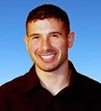The Importance of Sleep
BY Bill Yeager

Are you trying to troubleshoot why either you are not seeing the results you feel is deserved with your exercise routine? As I’m sure you know it is hard enough to get yourself to do what you are supposed to do to see results of your hard earned eating and exercise routines. When you are doing everything right and need to troubleshoot why the expected results aren’t there, that means it’s time to analyze what you may be doing wrong. Sometimes you can over analyze to the point where you nit-pick every little thing and you make unnecessary changes to the eating and exercise routine in an attempt for “perfection”. Perhaps you get a little frustrated when you can’t seem to figure out what might be holding you back from seeing the results that you deserve. If you seemed to have all the factors of eating right and exercising down pat and you still are seeing either slow or no results within yourself you may want to consider that sleep could be the problem. Understand the following stages and hormonal changes that the body will go through during sleep and let this serve as an educational and a troubleshooting guide for you.
We seriously sleep about 1/3 of our lives away. Why don’t we sleep less so we can work, exercise or even enjoy life more? Well if this is in your thoughts and actions, then you may need to more hours of sleep!
Why is it that I need to sleep?
First of all, melatonin (which will aid in making you fall asleep) is secreted from your pineal gland inside your brain. Its production happens at night where there is little or no sunlight. This is why some people who are blind may have irregular sleep patterns. Also inside your brain is what’s called the reticular formation, which is involved in filtering stimuli to dismiss irrelevant stimuli and amplify stimuli that require immediate attention (such as a person who is screaming for help or immediate danger coming your way) This will aid you if an immediate response by your brain and physical body is needed. Since this function in our brains is so active all day, it needs to be rested. Close to the reticular formation is a group of cells that participates in the chemical reaction that produces melatonin, its called serotonin. When this leaks to the reticular formation, by lying down, turning off the noises, shutting off the lights, etc, you begin to fall asleep. When this happens your breathing will slow down, your heart rate will drop, your muscles will relax a little and your brain will relax but also still be alert. About 3 minutes later, you are asleep. There are different stages of sleep that you will go through during sleep.
The Sleep Stages
Stage 1: As you begin to fall asleep, your eyes move back and forth slowly and the muscles in your body relax even more. In this stage you can be easily awakened and may experience twitches.
Stage 2: This is when your muscles relax even more and your eyes stop moving. Your brain waves will be slower with fewer bursts of rapid brain waves.
Stage 3: This is a lot deeper sleep; your pituitary gland secretes Testosterone and Growth Hormone. This may only last about 5 to 15 minutes.
Stage 4: During this stage it is difficult to wake someone up. The muscles and eyes are still, this may usually last about 30 minutes.
You will bounce between stages 2-4 until you fall into (REM) Rapid Eye Movement sleep. Your eyes will move back and forth rapidly while brain function goes into a state almost as if you were awake while you are dreaming. You may bounce back and forth throughout the night again and again between stages 2 through (REM) sleep. If you set your alarm to wake you up and you happen to be in (REM) sleep, then chances are you will remember your dream(s).
The Importance of Sleep
It is quite significant to be able to get into the third and forth stages of sleep. People who exercise at high levels of intensity for a long period of time will more often than not experience problems getting into (REM) sleep. Along with that, these same people will complain about not feeling rested, feel aches, pains or more muscle stiffness. Since this is the case, this even increases the reason to get as much sleep as possible (yes that means 8 hours) if you exercise. Although you may feel like you are able to “function” with less sleep, it will certainly catch up with you. One “make-up day of sleep” isn’t going to redeem your self of 6 nights of 2 hours worth of deprivation. If you are sleep deprived, it may take a lot longer to recover from illnesses by slowing down your immune system. You may also be losing out on natural production of hormones that can be repairing your cells from all the hard work in the gym. Perhaps this is the reason there has been some difficulty reaching your goals. The feeling of not being rested along with aches and pains during the day certainly is not the only reason why you should get more sleep, let’s go on to learn more about how hormones will change too.
Hormonal Changes During Sleep
In accordance to sleep, someone who exercises at high levels of intensity for a long period of time (meaning over 1.5 hours or so) or exercises using (HIIT) High Intensity Interval Training for a short period of time (meaning no more than 45 minutes to an hour) is not created equal to someone who does not exercise at all. For someone who does not exercise will enter stages 3 and 4 while their body secretes more amounts of (GH) Growth Hormone. Remember, if you are looking to build a better body, natural production of Growth Hormone is going to help a lot, the more naturally produced (GH) the better. During this time, cortisol is at it’s lowest during the first (REM) cycles and rise quite a bit at the last half of sleep. Too much cortisol is not going to benefit someone who is trying to build a better body, cortisol is also known for being produced by the adrenal gland in larger amounts during stress. Understand that when cortisol goes up, (GH) goes down and vice versa. In this same situation for the non-exerciser, Testosterone levels are low at the beginning of sleep and rise towards the end.
For those who exercise in long duration, the situation will flip flop. During the first part of sleep cortisol levels increase and (GH) decreases. The (GH) that is released is also very little at this time, furthermore Testosterone levels being secreted is minimal as well. You don’t see the transition of growth in (GH) and Testosterone until the later hours of sleep seeing that this situation is almost the opposite of someone who does not exercise.
Suggestions
Now I’m certainly not saying that long duration exercise and (HIIT) is bad, so do not look at it that way. Look at the situation of someone who exercises, they need more sleep so they can reach the hormone level changes that are necessary for optimal recovery. So that is another major reason to get more sleep, to not only get what the brain needs and to feel rested, but to optimize hormonal production to recover from exercise faster. So if you aren’t seeing the results you feel you should be getting you may be overtraining in proportion to your sleep patterns because you aren’t recovering enough during your sleep hours. Make sure you keep your workouts brief and intense to failure; also take at least one day off during the week of training. Keep your stress levels under control during the day so that your cortisol levels stay lower to help offset the immediate nightly rise. Another tip is to make sure you take some slow digesting protein such as casein also found in cottage cheese to help the best hormonal production. Get 8 to 9 hours of sleep so you can push harder during your workouts, recover for the next round of exercises and perhaps see the results that you are looking for.




